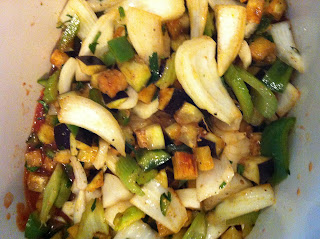 |
The đuveč from the Wikipedia
article on Serbia |
Welcome to my non sequitur life. As you may know, my folks are planning to go to Scotland and Wales this year, and due to the success of our trip to Ireland, I’m invited to go. This explains why I was looking up
cawl a few weeks back. In doing my research on our future trip, I spent Saturday afternoon googling the Celtic Nations, because I only remembered 4 of the 6 of them off the top of my head. (Ireland, Scotland, Wales and Cornwall. I forgot Brittany and the Isle of Man.) Then too, I only knew 4 of their 6 patron saints (Patrick, Andrew, David and Piran. St Anne is Brittany’s and St. Maughold – I never hear of him either – is Mann’s.) While I was trying to learn about his story – he was an Irish thief converted to the priesthood by St. Patrick’s nephew and found refuge on Mann – I saw that Irish writers called the Manx island
Eubonia. I had thought I saw that word before the night prior when I was reading Wikipedia articles on the Vampire Chronicles. So I double checked, but it was the name, Eudoxia. I looked up that name in Wikipedia and surfed from
Eudoxia to
Eudoxia of Heliopolis to
Baba Dochia to
Baba Marta to
Serbia. The Wikipedia article on Serbia was quite long and I got down to the cuisine section of the page. This was at dinner time and I thought that the picture of
đuveč [ɟuˈvɛtʃ]
(or
djuveč or
djuvech) looked delicious, all the while I was planning to finish off last week’s
bredie.
 |
| Layering the ingredients |
Đuveč is a Balkan oven-baked meat and vegetable stew similar to ratatouille. This dish is one of the national dishes of many former Yugoslav countries (Bosnia and Herzegovina, Croatia, Macedonia and Serbia) as well as of Bulgaria. The name of the dish comes from the dish in which this delicacy is traditionally prepared. The Slavic word comes from the Turkish
güveç for earthernware pot. With the temperature of this April and May, I think this sounds like a great treat for this week for dinner.
 |
| Seared pork |
Đuveč,
adapted from a djuvec recipe by Vesna, a freelance writer living in Madison, WI, which she in turn adapted from a recipe found in Yugoslav Cookbook
(1963, Izdavacki Zavod Jugoslavija).
Ingredients:
1 – 1½ lbs. onions, roughly chopped
1 large eggplant, cubed
1 bell pepper, diced
2 stalks celery, diced
¼ - ½ cp. of parsley, chopped
1 Tbsp. salt
1 Tbsp. paprika
½ Tbsp. black pepper
½ cp. + 2 Tbsp. olive oil
2 lbs. country-style pork ribs, cut in 1" cubes
28 oz. crushed tomatoes
½ cup uncooked white rice
1 lbs. fresh tomatoes, sliced
Directions:
1. In a mixing bowl, toss together well onions, eggplant, bell pepper, celery, parsley, salt, paprika, black pepper and ¾ cp. of olive oil; set aside.
2. In a heavy skillet on high, heat 2 Tbsp of olive oil to sear the pork in batches, until browned; set aside.
3. In the slow cooker, layer the ingredients in this order:
½ can crushed tomatoes
½ of the vegetable mixture
Rice
Browned pork
Remaining vegetable mixture
Remaining crushed tomatoes
Sliced tomatoes
4. Set the slow cooker on
Low and cook for 6-8 hours.
 |
| The final product |
One thing to note is that I don't think that I salted the
đuveč enough when I made it. I thought that I compensated for the slow cooking time (and I have also edited and up the amounts of seasoning since making.) Yet, a grinding or two of my pink Himalayan salt was just the trick to make the flavors pop. It has a heavy mouth feel – thick with tomatoes and delicate eggplant – and the herbal notes of celery and the floral notes of tender onion rang through. The pork just melted in my mouth. Now, I'm waiting on a co-worker to confirm the relative authenticity of the taste. Before eating, she did let me know that since I used pork as the meat that it was probably more Serbian, which would make the
đuveč, ђувеч, since the Serbs use the Cyrillic alphabet.





No comments:
Post a Comment